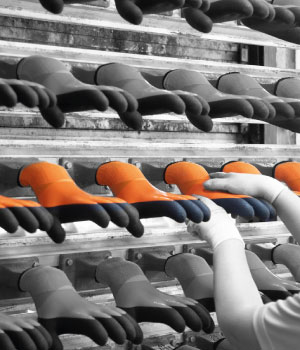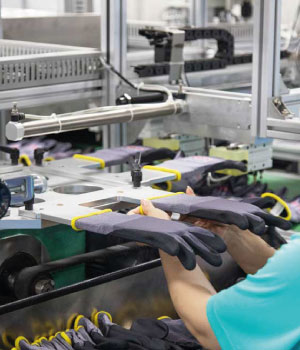Work Gloves | How We Design Work Gloves.
When we design a safety glove, we look closely at end-user requirements. We study the industry, the type of materials
being handled, tasks, operations and the working environment. These are all key factors when we formulate the specification
for a new work glove.
Our technicians have extensive experience and expertise which enables them to create a hand protection solution ideal
for a specific end use. A great number of factors are taken into account when developing a new product, the possibilities
are almost endless with so many variables at our disposal. Adjustments to spec are made to enhance, performance,
dexterity, durability or to work within a set budget.
Fibre and Yarn Design
Knowing and understanding the different properties of fibres and
yarns is critical when designing a safety glove. They have great
bearing on how it will perform.
Lots of different fibres can be used to spin yarn for work gloves,
Nylon, Spandex, cotton, polyester and HPPE to name but a few.
These fibres can be blended or spun with other materials to add
strength, flexibility or comfort. Kevlar®, Dyneema ® and
high-tensile steel are great examples of this.
Not only can materials be blended within yarns, yarns can also be
spun in a variety of different ways to produce additional benefits.
Spinning techniques include Dual Twist, Cotton Spun and Stretch
Broken. Yarn composition and structure will also affect machine
running speed and must be considered as a factor for cost and
lead-times.
The knitted base of the glove, regardless of what fibre is used, is
known as the glove shell.
You can find out more about fibre technology by clicking here
Glove Coating
Modern day work gloves tend to be coated (or dipped) with
polymers, a molecular substance or material used to coat
areas of a gloves’ shell in order to create or enhance particular
characteristics.
There are various different types of polymer both synthetic
and natural, they all have their own specific properties and
can be applied in isolation or together to form a bi-polymer.
Many gloves have a polymer coating to the palm and fingers and in some instances, it extends over the back of the hand
depending on the required function of the glove. Gloves are often referred to as either palm coated or fully coated which
denotes the extent of the polymer coverage.
Polymers are selected to enable a range of useful benefits; powerful grip, durability, dexterity, liquid or oil resistance,
breathability or touch-screen capabilities are typically desired by industry. Coatings are applied to fulfil these requirements.
The design process will match a polymer with a shell to create the optimum protection for the desired end use.
Our range encompasses many types of polymer and you can find out more about them individually here.

In addition to polymers, gloves can also have leather palm coating, or be entirely made of leather. This natural material
is known for strength, durability and powerful grip. Some dipped gloves are further reinforced with leather especially in
vulnerable areas of the hand.
Factories & Machines
Our manufacturing facilities are set up for producing a whole spectrum
of glove types, they have different machines, different processes
and operatives with specific skill-sets. The nature of the glove and
it’s intended end use will determine where we place our production.
We have a number of manufacturing plants around the world including
in the UK giving us full control over our supply chain.
Some factories specialise in gloves for heavy industry, sometimes
leather or with leather reinforcements, whereas others produce featherlight
gloves for precision handling.
The weight of a glove is determined by the gauge of the knitting machine.
It’s measured by the number of stitches per square inch of
fabric. The higher the number, the more stitches and therefore the
finer and more form-fitting the glove will be. We select the factory
that can best accommodate our required gauge.
Choosing the correct factory also ensures cost effectiveness. Price benefits are achieved when the manufacturing line is
designed to produce a certain glove specification. Fine tuning for materials is made simple and running speed is maximised.

Additional Technologies
Our additional technologies are like a highly-specialised too kit, we mix and match them with different gloves to maximise
protection and functionality. They enable us to go the extra mile for our customers by making their glove just perfect!
These are just a few of the technologies in our tool kit:
Ballistic Reinforcement
A material that’s used in bullet-proof clothing
forms part of glove’s construction between thumb and forefinger, it cannot
become detached and protects the most delicate part of the hand.
Touch-Screen Fingertips
Work gloves with the ability to operate
a smart phone, tablet or digital control panel without removing the
glove.
Premium Grade Leather
We use specially selected leather from the
top section of the hide only to ensure quality and dimensional stability.
We use leather strategically to maximise protection, grip and durability
High-Density Polyurethane
A specialist dip that significantly increased
glove durability and lifespan, hence improving cost-effectiveness.
Anti-Bacterial Treatment
The glove is sanitised as part of the manufacturing
process which improves hand hygiene, removes odour and makes the glove far more comfortable.
We can design the perfect glove for you...
As you can see, there are so many different factors involved in designing a safety glove, we have a fantastic amount of
flexibility.
Our range is made up of gloves that we have specifically designed for different industries and many that we have developed
for individual customers. We pride ourselves on being able to produce bespoke solutions and encourage industry
approach us with their requests.
New Work Gloves
Cut Fibre
Nitrile Micro Foam
Palm Coated
Cut Fibre
Nitrile Micro Foam
Palm Coated
Nylon
Double Dip Nitrile
Fully Coated
Enquire About Our Enquire Abour Our Work Gloves.


